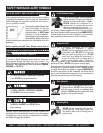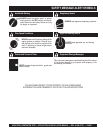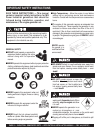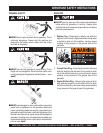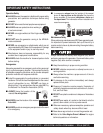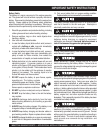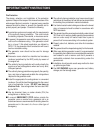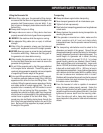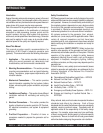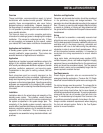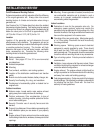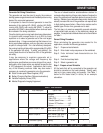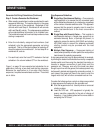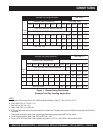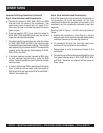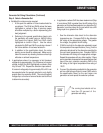
PAGE 14 — INDUSTRIAL GENERATOR SETS — APPLICATION & INSTALLATION MANUAL — REV. #4 (09/07/07)
INTRODUCTION
Introduction
Engine-Generator sets provide emergency power in the event
of utility power failure, provide power where utility power is
not available and can provide an alternative power means in
areas where utility power may be more expensive.
Part of the reason for the growing emphasis on emergency/
standby power systems is the proliferation of electronic
computers in data processing, process control and life
support systems, and any other system that requires a
continuous, uninterrupted flow of electrical energy. Generator
sets must be applied in such a way as to provide reliable,
electrical power of the
quality
and
capacity
required.
About This Manual
This manual provides specific recommendations for
installation of MQ Power's Industrial generator sets
(gensets). This manual will contain the following information:
1. Application — This section provides information on
sizing the correct generator set, determining load
characteristics, and environmental considerations.
2. Mounting Recommendations — This section provides
mounting recommendations such as typical fastening,
footing, foundations, proper space requirements, and
vibration isolation.
3. Mechanical Connections — This section provides
typical information regarding the fuel system, battery
system, exhaust system, proper ventilation, and proper
cooling.
4. Ventilation and Cooling — This section shows different
installation methods for ventilating and cooling the
genset.
5. Electrical Connections — This section provides the
location of electrical connection points for DC Controls,
AC electrical connections, and system & equipment
grounding.
6. Pre-Start Preparation — Checklist of items or
procedures needed to prepare the generator set for
operation.
Safety Considerations
MQ Power's gensets have been carefully designed to provide
safe and efficient service when properly installed, maintained,
and operated. However, the overall safety and reliability of
the complete system is dependent on many factors outside
the control of the generator set manufacturer. This manual
is provided to illustrate recommended electrical and
mechanical guidelines for a safe and efficient installation.
All systems external to the generator (fuel, exhaust,
electrical, etc.) must comply with all applicable codes. Make
certain all required inspections and test have been
completed and all code requirements have been satisfied
before certifying the installation is complete and ready for
service.
Always remember: SAFETY FIRST!!! Safety involves two
aspects: safe operation of the generator set itself (and its
accessories) and reliable operation of the system. Reliable
operation of the system is related to safety because
equipment affecting life and health, such as life-support
equipment in hospitals, emergency lighting, building
ventilators, elevators, and fire pumps may depend upon the
generator set.
In North America, many safety (and environmental) issues
related to generator set applications are addressed by the
following standards of the National Fire Protection
Association (NFPA):
z
Flammable and Combustible Liquids Code — NFPA 30
z
National Fuel Gas Code — NFPA 54
z
National Electrical Code — NFPA 70
z
Health Care Facilities Code — NFPA 99
z
Life Safety Code — NFPA 110
z
Emergency and Standby Power Systems — NFPA 110
z
Storage and Handling of Liquified Natural Gas —
NFPA 59A
Many national, state, and local codes incorporate the above
standards (and others) by reference. Each of these
standards and the codes that reference them are periodically
updated, requiring continual review. Compliance with all
applicable codes is the responsibility of the facility design
engineer. For example, some areas may have certificate-
of-need, zoning permit, building permit, or other site specific
requirements. Be sure to check with all local governmental
authorities before designing the generator set installation.



